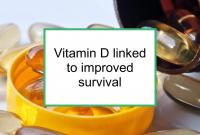Vitamin D appears to be an integral part of breast cancer development and progression, but the relationship is not fully understood. Vitamin D regulates the flow of calcium into the bloodstream and is crucial for normal bone development. Vitamin D influences the expression of breast cancer-related gene activity.
These genes control aspects of cell differentiation, cell growth, and angiogenesis, all of which are related to cancer development and progression. Low levels of vitamin D are associated with higher risk of breast cancer. In addition, women with low levels of vitamin D at diagnosis tend to have more aggressive breast cancer than women with adequate levels.
Normal breast cells lose their ability to respond to Vitamin D's favorable effects during their transformation to a malignant state, while at the same time increasing their ability to degrade vitamin D. Vitamin D deficiency has been linked to increased growth of bone metastases. On the other hand, treatment with vitamin D3 inhibits excess glucose production and alters mechanical properties in ways that serve to reduce metastasis in breast cancer cells. Adequate vitamin D levels at diagnosis appear to improve long-term survival. The question of whether vitamin D supplementation during breast cancer treatment can improve survival has received little study and produced inconsistent results. Now a large new Irish study has reported that post-diagnosis vitamin D supplementation is associated with superior breast cancer-specific survival, especially if initiated shortly after diagnosis.
Optimal Vitamin D level
Vitamin D3 (cholecalciferol) is the most physiologically active form of vitamin D. The blood test for vitamin D measures the level of 25-hydroxyvitamin D (25(OH)D), which is the primary metabolic product of vitamin D3 in the serum. Cancer study results have led researchers to the conclusion that vitamin D levels adequate for bone health might still leave women at higher than average risk of breast cancer. The optimal vitamin D level for breast cancer prevention appears to be at least 40 ng/mL (40 to 50 ng/mL may be an appropriate target range). Most women can achieve this level by including vitamin-D rich foods in the diet, increasing sun exposure (without significant tanning or sunburn), and supplementing with 1,000 to 2,000 IU of vitamin D3 per day. The appropriate vitamin D3 level goal for women undergoing treatment for breast cancer has not been established.
Taking megadoses of vitamin D to achieve extra-high levels of vitamin D carries risks of adverse effects and is not recommended. Some studies have used doses of as much as 50000 IU/week, a dosage that appears not to result in vitamin D toxicity (which manifests as high levels of calcium in the blood, as well as bone and kidney problems) in the short term. Evidence to date suggests that the toxicity threshold is between 10000 and 40000 IU of vitamin D per day for long-term use. However, doses as low as 5000 IU of vitamin D per day can cause kidney stones in susceptible individuals. The National Academy of Medicine has set the tolerable upper intake level at 4000 IU.
Latest research links post-diagnosis vitamin D to improved survival
The study referenced above was designed to investigate the association between vitamin D supplement use begun after diagnosis and breast cancer-specific survival. To conduct the study, the authors used Irish pharmacy claims records and national cancer registry data. The study included 5,416 women aged 50 to 80 years who had been diagnosed with invasive breast cancer. National prescription data was used to identify new vitamin D prescriptions after diagnosis among the breast cancer patients (2,581, or 49%, of the women).
Breast cancer-specific mortality was found to be 20% lower in de novo vitamin D users than non-users. The death rate was 49% lower if vitamin D was initiated within six months of breast cancer diagnosis. The authors conclude that vitamin D has the potential to serve as a non-toxic and inexpensive agent to improve survival in breast cancer patients. More studies are needed to explore the effect of vitamin D supplementation on breast cancer survival, according to the authors.
Please see our article on vitamin D for more information.
